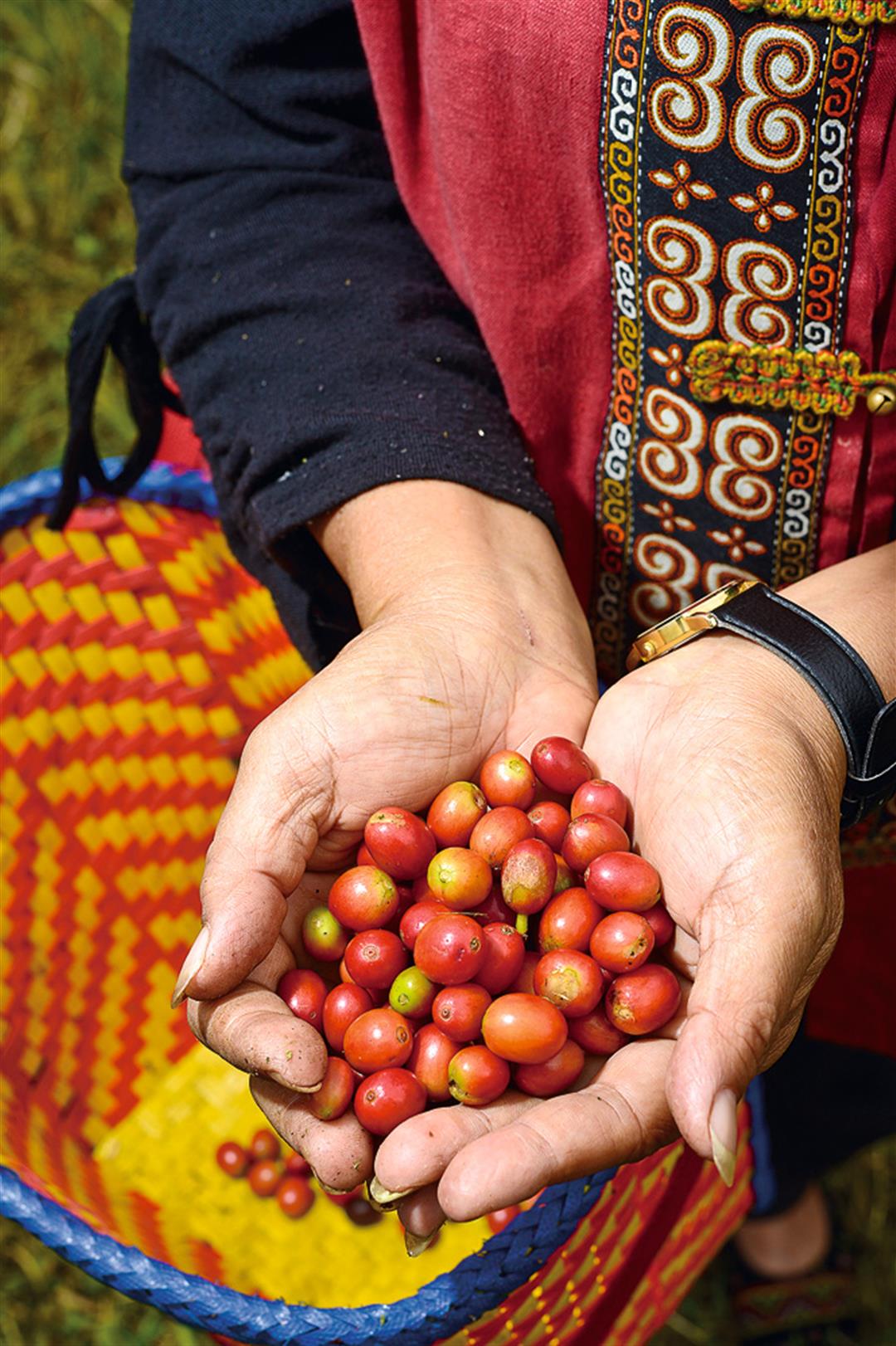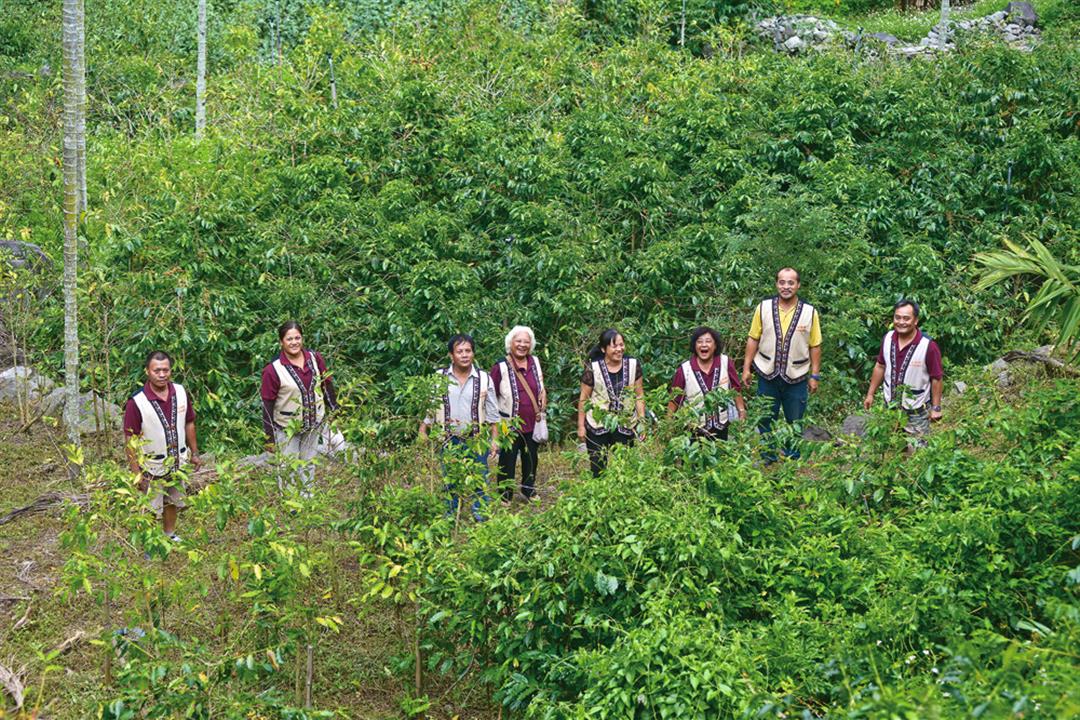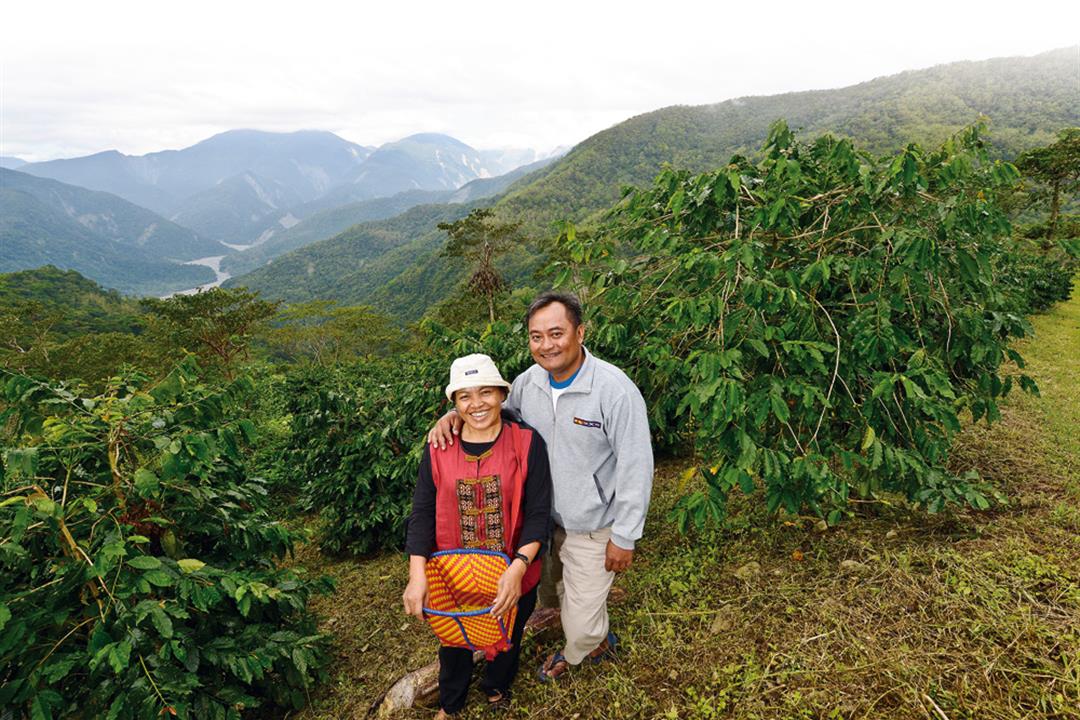Coffee Enlivens the Hot Springs Village of Rulakes
Sam Ju / photos Chuang Kung-ju / tr. by Jonathan Barnard
December 2013

Small farmers are the backbone of agriculture in Taiwan, and on that score coffee growers are no exception. But by facilitating mutual assistance among farmers and economies of scale for marketing, a coffee production and sales team in Liqiu Village in Taitung’s Jinfeng Township has successfully been raising the profile of Rulakes coffee.
Like Zhiben, Jinlun is one of Taitung’s most famous hot springs areas. The Jinlun River, which flows through Jinfeng and Taimali townships, has several hot springs areas along its banks, including Jinlun and Jinhuang, the latter of which was buried by landslides after Typhoon Morakot in 2009.
The Jinhuang hot springs sit in Liqiu Village, which is a tribal settlement of both the Paiwan and the Rukai tribes. The Aboriginal name for the village—Rulakes—means “place of many camphor trees.”
“The camphor groves hereabouts are long gone, but the area given over to coffee trees is steadily increasing,” says Luo Zhonghui. Luo is the driving force behind the Jinfeng Coffee Production and Sales Team, which was established in April of 2011. It is the twelfth such organization in the county.
According to the Council of Agriculture, as of August 2013, 65 coffee production and sales teams had been established throughout Taiwan. Taitung County holds an island-leading 13, with members who are overwhelmingly Aborigines.

The coffee production and sales team in Rulakes, a tribal settlement in Taitung’s Jinfeng Township, has helped local farmers develop an important new source of revenue.
The 300-some-odd souls of Rulakes are chiefly employed in growing millet, sugar apples, bird’s nest fern and taro. The village also contains numerous Arabica coffee trees, but for many years most of the village’s famers would sell their beans cheaply, not realizing that the value of the crop would rise greatly if the beans were roasted.
In 2010 Luo Zhonghui began to organize the production and sales team, with a goal of advancing a brand of exquisite coffee from the tribal settlement. Local farmers have taken control of the entire process, from growing the coffee organically, to processing and selling the beans.
When the crop is not damaged by typhoons or other adverse conditions, the harvested coffee beans can typically fetch NT$1000 per pound, explains Luo, with earnings of NT$5000 per tree. Once you subtract the costs of organic fertilizer and pest control, the profits come to about NT$2500 per tree.
Ten farmers, mostly in their fifties, answered Luo’s call to join the production and sales. At altitudes ranging from 300–800 meters, they have planted about 8000–10,000 coffee trees on 15 hectares. Their organic certification is pending.
Luo’s confidence about organic coffee was in large part thanks to the encouragement he got from his sister Luo Yinghui.

When Luo Zhonghui (right) retired from the military several years ago, he returned to Rulakes to establish a coffee production and sales team there. His sister Luo Yinghui is a model member of the team, growing beans that have won awards at tasting competitions.
Luo Yinghui is an expert maker of Aboriginal handicrafts. Apart from operating a homestay and handicrafts shop in Taimali Township, she planted a hectare of coffee trees at an elevation of 800 meters eight years ago.
She goes up to that plot at least twice a week. She doesn’t spray pesticides or herbicides, and she insists on weeding and picking herself, despite the plot’s steep slopes.
After the production and sales team was established, Luo Yinghui became a member. At the end of 2011 she entered her coffee in a contest. It ended up getting selected as one of “Ten Outstanding Coffees from Taitung” and became an example for the whole team.
The two hectares of coffee that Yinghui’s brother Luo Zhonghui now has under cultivation have been temporarily given to his sister for her care. With the production and sales team still in its infancy, Luo Zhonghui is handling all the administrative work. He believes that at this stage it is most important for the team to find “the right resources and the right people.”
Consequently, he has been diligently writing proposals for grants from the Council of Indigenous Peoples and the Industrial Technology Research Institute, and has been attending seminars related to coffee so as to gain an understanding of the latest information that could be useful to the team.
Study, study and more study“Growing coffee requires a lot of knowledge,” says Luo Zhonghui. He explains that different varieties are suited to different growing conditions, and that crop maintenance must be tailored to the specifics of the location. Coffee trees grown at different elevations require different methods of pruning. If you use the wrong method, the trees will more easily fall victim to disease.
In order to help the production and sales team’s farmers gain needed knowledge, Luo Zhonghui often invites coffee experts to come to the village to provide instruction.
Liao Tiancheng, executive director of the Taitung Coffee Association, explains that Taitung’s coffee belongs to the category of “island coffee.” The growing environment here is a lot like that of Hawaii. After brewing, the coffee’s special character includes its richness, sweetness and lack of astringency. At high elevations, the differences between daytime and nighttime temperatures are dramatic, and that produces coffee beans with higher density and richer flavors. It’s a strong suit of the coffee grown by Aborigines in Taiwan.
Li Xinyi, 53, is deputy director of the production and sales team. Apart from using half a hectare to plant coffee, he also plants bird’s nest fern, millet, and plums. The bird’s nest fern provides the lion’s share of his income, but the coffee he grows fetches the highest unit price.
Luo Zhonghui says he hopes that all of the farmers who have received training from the production and sales team will become coffee growers, so that they can attain another stable source of revenue in addition to running homestays.
Growth and stabilityRulakes’ coffee producers currently employ outsiders to roast the beans. After the beans are bagged, Luo Zhonghui leads groups of members to agricultural produce shows, where they sell the beans. Hitting the road in this manner, they have managed to build name recognition for Rulakes coffee. Buzz is building, but Luo has had to turn down orders because “there aren’t enough beans.”
The record of the production and sales team has attracted attention, so that even non-Aborigines have expressed an eagerness to plant coffee in Rulakes. But Luo is not considering making any moves in that direction. Instead, he is looking to achieve stability first. Only then will he pursue expansion.
Next year, the team plans to rent a space in Taimali, which it will turn into a coffee shop, giving travelers who do not come all the way to Rulakes a chance to taste some authentic mountain-grown coffee.
As it builds its own brand, this old hot springs town has found itself being transformed by coffee.

@List.jpg?w=522&h=410&mode=crop&format=webp&quality=80)




